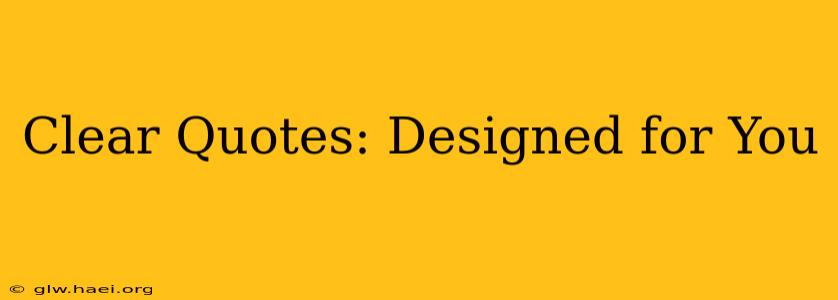Have you ever struggled to find the perfect quote to express exactly what you feel? Maybe you're crafting a heartfelt speech, designing a captivating presentation, or simply searching for inspiration to brighten your day. The right quote can be transformative, adding power, elegance, and resonance to your message. But sifting through endless databases of quotes can feel overwhelming. That's where the magic of clear quotes comes in – quotes designed with you in mind.
This isn't just about finding any old quote; it's about discovering the perfect quote – one that resonates deeply, speaks to your unique situation, and leaves a lasting impression. We're diving into the world of carefully curated quotes, exploring why they matter, and how you can harness their power to elevate your communication and self-expression.
What Makes a Quote "Clear"?
A "clear" quote isn't simply concise; it's easily understood, impactful, and relevant. It cuts through the noise, delivering a powerful message with precision and clarity. Think of it as a perfectly sharpened arrow, aimed directly at the heart of your intended meaning. The clarity comes from several factors:
- Simplicity: The best quotes avoid unnecessary jargon or overly complex language. They communicate profound ideas using simple, accessible words.
- Relevance: A clear quote directly relates to the context in which it's used. It enhances your message, providing a supporting argument or a fresh perspective.
- Impact: A truly clear quote leaves a lasting impression. It's memorable, thought-provoking, and often inspires action or reflection.
Why are Clear Quotes Important?
The power of a well-chosen quote should not be underestimated. They can:
- Enhance Persuasion: A compelling quote adds weight and credibility to your argument, persuading your audience more effectively.
- Evoke Emotion: Quotes can tap into universal human experiences, connecting with your audience on an emotional level.
- Provide Inspiration: A motivating quote can ignite passion and encourage action, boosting morale and driving progress.
- Save Time and Effort: Sometimes, a well-chosen quote can eloquently express an idea far more effectively than you could in your own words.
How to Find the Perfect Clear Quote for Your Needs
Finding the ideal quote isn't a random process; it's a journey of discovery. Here's a strategy to help you:
- Define your purpose: What message are you trying to convey? What feeling do you want to evoke?
- Identify your audience: Who are you trying to reach? Their background and interests will influence your quote selection.
- Explore diverse sources: Don't limit yourself to a single quote database. Explore books, articles, speeches, and even social media for inspiration.
- Consider the tone: The tone of your quote should complement the overall tone of your message.
- Test and refine: Before settling on a quote, consider how it sounds in context. Does it truly resonate with your message and audience?
What types of clear quotes are there?
This question delves into the various categories of quotes one might encounter when seeking the perfect phrase. The spectrum is vast, ranging from motivational quotes designed to inspire action to philosophical quotes offering deeper contemplation. Humorous quotes can lighten the mood, while inspirational quotes can uplift the spirit. Ultimately, the best category depends on the intended application and the desired impact. For instance, a business presentation might benefit from powerful, results-oriented quotes, whereas a personal reflection might be enhanced by a more introspective and emotional quote. The choice is incredibly nuanced, depending on individual needs and objectives.
Where can I find clear quotes?
Finding suitable quotes depends greatly on the specific context. Websites specifically dedicated to quote collections are excellent starting points. Beyond these, exploring literary works, historical speeches, and philosophical texts often unearths gems that are both impactful and precisely worded. The key lies in focusing your search based on the topic and tone you desire. A more refined search within specific online archives or databases (dedicated to particular authors or subjects) will further streamline the process, leading to a quicker discovery of the ideal quote.
How do I use clear quotes effectively?
Effective use of quotes demands context and proper attribution. Simply inserting a quote without proper integration can disrupt the flow of your writing or presentation. Quotes should serve to enhance or support your point, not replace it. Always cite the source, giving credit to the original author. Furthermore, consider the quote's tone; it should align with your overall message, ensuring consistency and coherence.
By thoughtfully selecting and incorporating quotes, you can enrich your work, create a stronger connection with your audience, and leave a lasting positive impact. Remember, the power of a clear quote lies in its ability to articulate an idea concisely and effectively, resonating deeply with its listeners or readers.

